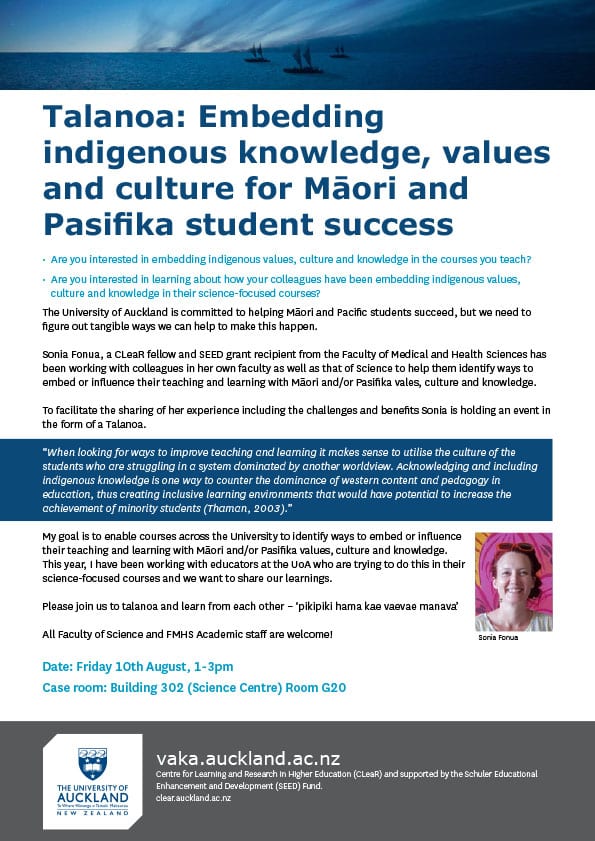On Friday 10 August 2018 a group of academics and professional staff members from the University of Auckland gathered as part of a talanoa on embedding indigenous knowledge, values and culture for Māori and Pasifika student success. The group was welcomed by Kaiarahi Michael Steedman from the Faculty of Science.
As explained by CLeaR (Centre for Learning, Education and Research) Lecturer Dr ‘Ema Wolfgramm-Foliaki, the word ‘tala’ means to talk or to tell and ‘noa’ is literally ‘nothing in particular’ or as Sitiveni Halapua argued talanoa is talking without concealment in a purposeful way. ‘Ema discussed the gathering in relation to CLeaR’s 2018 theme ‘He Vaka Moana: Navigating Māori and Pasifika student success’ and the Tongan proverb: pikipiki hama kae vaevae manava, a saying used to capture the ancient practice of lashing together vaka moana as they traversed the Pacific Ocean to share rations, swap resources and share knowledge before untying and continuing on their journeys.

2018 CLeaR Fellow Sonia Fonua from Te Hikita te Ora, the Certificate in Health Sciences, University of Auckland
This talanoa was lead by Sonia Fonua, 2018 CLeaR Fellow for the Faculty of Medical and Health Sciences as well as a SEED grant recipient who works on Te Hikita te Ora, the Certificate in Health Sciences, a bridging/foundation course for Māori and Pacific students interested in pursuing a career in health programmes offered by the University of Auckland.
Sonia was joined by some of the participants from her CLeaR Fellowship and SEED grant project ‘Lalanga ha kaha’u monu’ia – Embedding Indigenous knowledge, values, and culture for Māori and Pasifika Student Success’ including: Dr Suzanne Reid (Biomedical Sciences); Dr Anuj Bhargava (Physiology); Dr Trudi Aspen (Pharmacy); Dennis Hsu (Population Health); Whaea Julie Wade and Elizabeth Wilson (Tutor, Certificate in Health Sciences). Hosted by CLeaR Fellow Julia Novak and Kaiarahi Michael Steedman at the Science Faculty, Sonia’s colleagues spoke about how they have started a process of critical self-reflection to be able to begin considering how to embed indigenous values, knowledges and cultures into their various courses. Dr Suzanne Reid (Biomedical Sciences); Dr Anuj Bhargava (Physiology); Dr Trudi Aspen (Pharmacy) and Dennis Hsu (Population Health) discussed the practical ways in which they were beginning to introduce strategies and activities into large undergraduate papers that go some way into embedding indigenous ways of knowing and being into their teaching. Whaea Julie Wade (cultural liaison for the project) gave her perspective of the initative and Elizabeth Wilson (project research assistant and tutor, Certificate in Health Sciences) gave an extremely honest and moving account of what is like for a Pacific student to come to the University of Auckland.
Over 60 staff members (both academics and professionals) attended the event and an enormous amount of positive comments and feedback was received. There were even questions about when the next event will be held! The second half of the session was an open talanoa with all present and there was much heart and emotion as people commented and asked questions. The strong turn out, Ema explained “is what Hinekura and I envisaged would be the result of our ‘pikipiki hama’ with one another.”
Well done Sonia and her colleagues. Malo ‘aupito!
Another talanoa will be held in November, if you would notification of this event, please advise:
CLeaR Project Coordinator Victoria Wynne-Jones at victoria.wynne-jones@auckland.ac.nz







Recent Comments